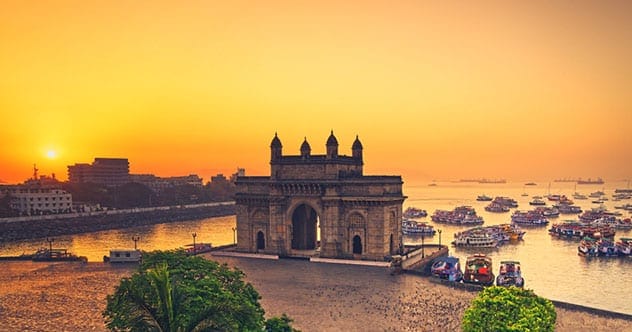When we think of famous landmarks, we often picture stunning buildings or natural wonders recognised worldwide. But beyond their beauty and grandeur, many of these iconic sites hold secret stories, forgotten tales, and captivating legends. These narratives add layers of mystery and intrigue, making a visit even more special. Let’s peel back the curtain and dive into 10 such tales that will change the way you see these famous places!
10Christ the Redeemer’s Hidden Wishes

The majestic Christ the Redeemer statue watches over Rio de Janeiro, Brazil, its open arms a symbol of peace. This Art Deco marvel is one of the New Seven Wonders of the World. But did you know it holds tiny secrets within its very fabric? The statue is covered in about six million small, triangular soapstone tiles.
During its construction in the 1920s and early 1930s, workers who painstakingly cut and applied these tiles often wrote messages on their backs. These weren’t grand pronouncements, but personal notes – perhaps a wish, a prayer, or the name of a loved one. Imagine, millions of tiny, hidden sentiments make up the surface of this iconic figure. One worker, Lygia Maria Avila da Veiga, proudly spoke of writing many wishes on the tiles, knowing they’d forever be part of the monument, high above the city.
9Crazy Horse Memorial: A 70-Year Dream

In the Black Hills of South Dakota, a monumental carving is slowly taking shape. The Crazy Horse Memorial, intended to be the world’s largest sculpture, has been under construction for over 70 years and is still not finished. Work began in 1948 when Polish American sculptor Korczak Ziolkowski embarked on this ambitious project with very little money and no modern equipment. He dedicated his life to carving the likeness of the Oglala Lakota warrior, Crazy Horse, into Thunderhead Mountain.
Ziolkowski worked mostly alone for many years. He even built a 741-step wooden staircase to reach the mountain face. Before he died in 1982, his last wish was for his family to continue the work. Today, his wife and several of their children carry on his vision. The memorial is a tribute to Native American heritage, envisioned as an answer to the nearby Mount Rushmore. When completed, Crazy Horse will point towards the lands where many Native Americans are buried, a powerful symbol of pride and remembrance.
8One Tree Hill: The Story of a Single Tree
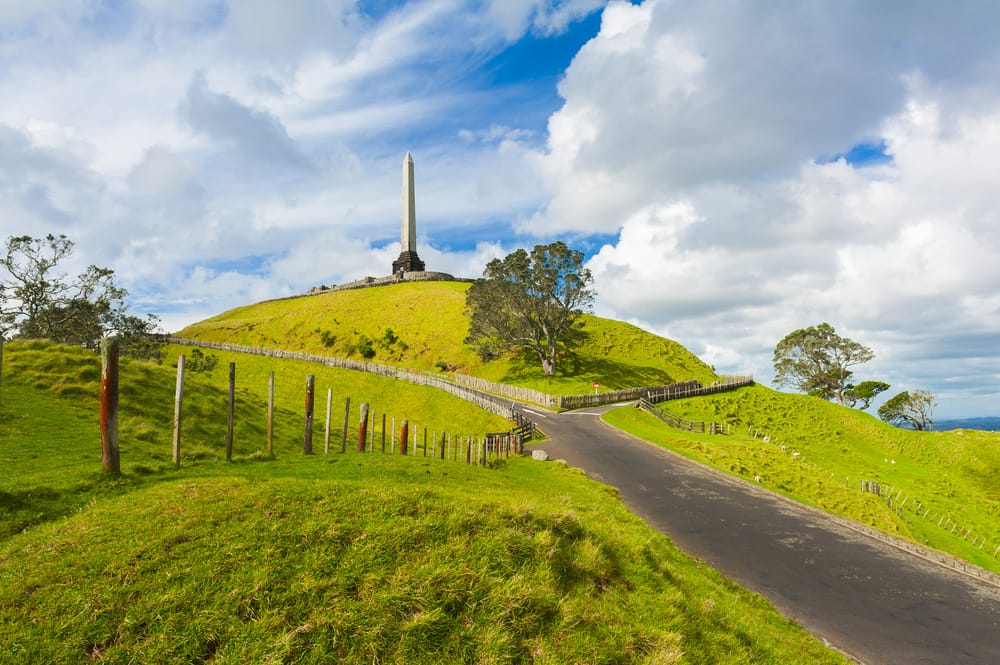
One Tree Hill, or Maungakiekie, is a volcanic peak in Auckland, New Zealand, rich in Maori history. It was once the site of a fortified Maori village. After a battle around 1740, the village was abandoned, leaving just one native tree standing, giving the hill its English name. Sadly, this lone totara tree was cut down by a European settler in 1852.
Later, Sir John Logan Campbell planted a grove of pine trees, but only one Monterey pine survived. This single pine became iconic but was also a point of contention. Maori activists attacked it twice, in 1994 and 2000, to protest grievances. After the tree was finally removed, a new chapter began. In 2016, nine young native trees, both totara and pohutukawa, were planted. They are now protected, and eventually, the strongest one will be chosen to stand alone, restoring the hill’s original symbolic meaning.
7The Blue Mosque: A Royal Misunderstanding?
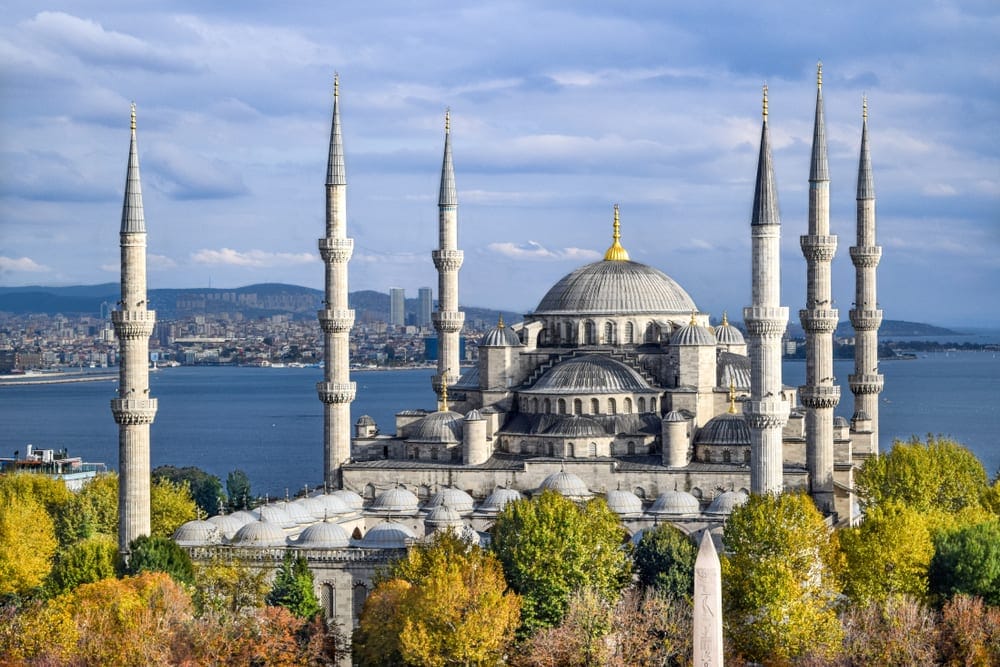
The Sultan Ahmed Mosque in Istanbul, Turkey, famously known as the Blue Mosque for its stunning blue Iznik tilework, is a masterpiece of Ottoman architecture. Built between 1609 and 1616, it was intended to be a grand statement of imperial power. One of its most distinctive features is its six minarets. But how it came to have six is a tale of its own.
According to one story, Sultan Ahmed I insisted on six minarets. This was controversial because, at the time, only the Grand Mosque in Mecca had six. To solve the issue, the Sultan is said to have ordered a seventh minaret to be added to Mecca’s mosque. However, another, perhaps more charming tale, suggests it was all a misunderstanding. The Sultan wanted gold minarets (altin in Turkish), but his architect supposedly misheard it as six minarets (alti in Turkish). Whether by grand design or a lucky mistake, the six minarets make the Blue Mosque uniquely beautiful.
6Hole-in-the-Wall: The Legend of the Sea People

Along South Africa’s stunning Wild Coast lies a remarkable natural landmark called Hole-in-the-Wall. It’s a massive, detached cliff with a large archway carved through its center by the relentless power of the waves. The local Xhosa people call it ‘iziKhaleni’, meaning ‘place of thunder’ or ‘place of sound’. But it’s the legend behind it that truly captures the imagination.
As the story goes, the Mpako River once formed a lagoon, blocked from the sea by this very cliff. A beautiful young girl used to sit on the cliff, mesmerized by the ocean. One day, a man from the sea people, with long flowing hair and flipper-like hands and feet, emerged and asked for her hand in marriage. Her father, furious, forbade it. The girl, heartbroken, met her sea lover again. He told her to wait for high tide. When she returned, the sea people, using a giant fish as a battering ram, smashed a hole through the cliff. The lagoon waters rushed out, and the sea people, with the girl and her lover, disappeared into the ocean, never to be seen again. Locals say that at high tide, you can still hear the sea people singing through the hole.
5One World Trade Center: An Angel in the Light?

The rebuilding of the World Trade Center complex after the tragic events of September 11, 2001, brought forth the Freedom Tower, now known as One World Trade Center. Each year, the Tribute in Light memorial shines two powerful beams into the sky where the Twin Towers once stood. On September 11, 2016, fifteen years after the attacks, photographer Rich McCormack captured something extraordinary in his photos of the lights.
High up, at the apex of one of the light beams, a distinct figure appeared, resembling an angel with outstretched wings, or perhaps a religious figure. McCormack insisted his photos were not altered. While many attributed the image to pareidolia (seeing familiar shapes in random patterns) or an optical illusion, for others, it was a comforting and deeply spiritual sign – a symbol of hope or a guardian angel watching over the city.
4Alhambra’s Gate: A Prophecy of the End Times
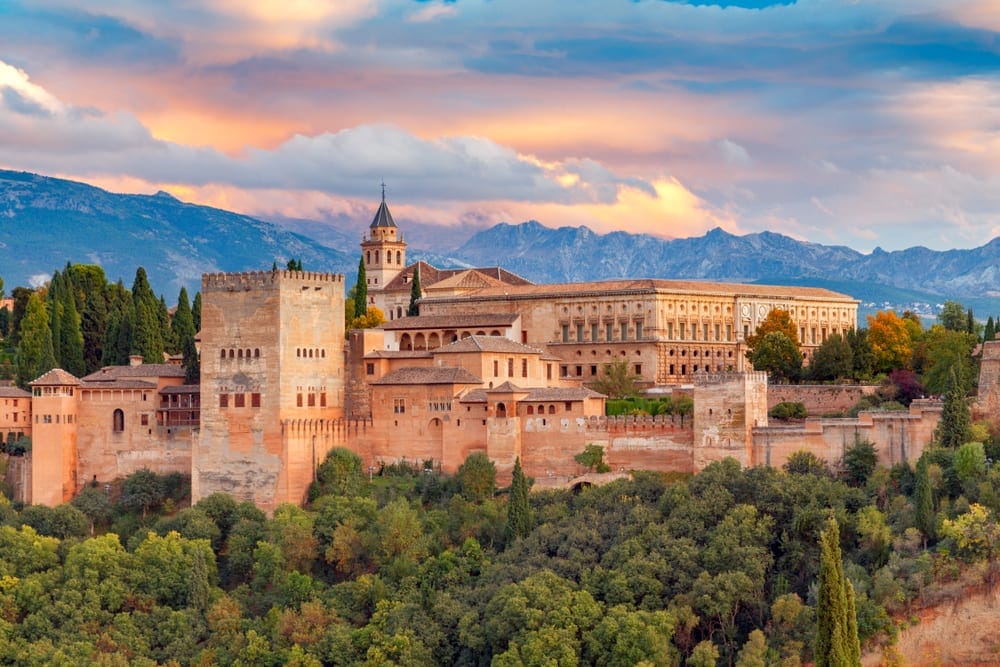
The Alhambra palace and fortress complex in Granada, Spain, is a breathtaking example of Moorish architecture from the Islamic Golden Age. Built primarily in the 13th and 14th centuries, it’s a place steeped in history and legend. One of its most intriguing tales concerns the Puerta de la Justicia, or Gate of Justice, one of the main entrances.
Carved into the outer arch of this gate is a hand, and on the inner arch, a key. Both are significant Islamic symbols, the hand often representing protection against the evil eye. An ancient legend whispers that the Alhambra will stand, and the world as we know it will continue, only until the stone hand on the outer arch reaches down and grasps the key on the inner arch. When these two symbols finally touch, it is said that the Alhambra will fall, and it will mark the end of the world. Some even say a statue of the Virgin Mary was placed above the gate by later Christian rulers to prevent this prophecy from coming true.
3Pena Palace & Sintra’s Yellow Rock Riddle
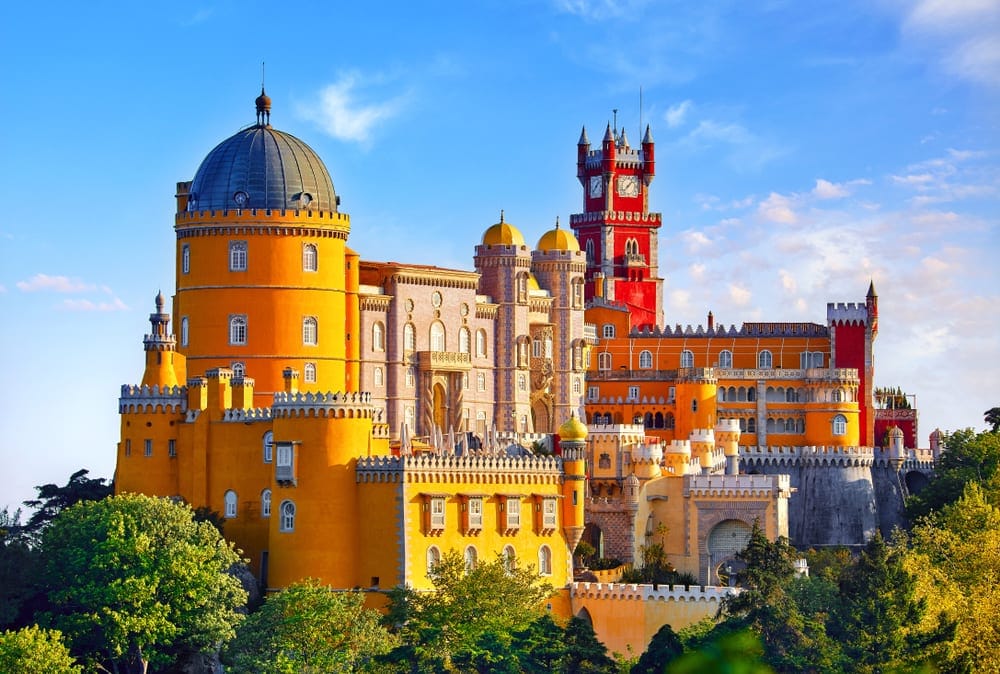
Perched atop a hill in the Sintra Mountains of Portugal, the romantic Pena Palace looks like something straight out of a fairytale. Its history began with a medieval chapel dedicated to Our Lady of Pena, where an apparition of the Virgin Mary was reportedly seen. King John II later ordered a monastery built on the site. The colorful palace we see today was commissioned in the 19th century by King Ferdinand II.
The town of Sintra itself is full of myths. One concerns a large, peculiar stone in a remote area, known as the Yellow Rock. Legend says that a great treasure is buried beneath this rock. But there’s a catch: to claim the treasure, one must topple the massive stone by throwing only eggs at it! An old tale recounts an elderly woman who tried her luck with a huge basket of eggs. She threw every single one but failed to move the rock an inch. To this day, the yellowish moss growing on the rock is said to be the dried yolks from her unsuccessful attempt.
2Gateway of India: A Ceremony of Strength
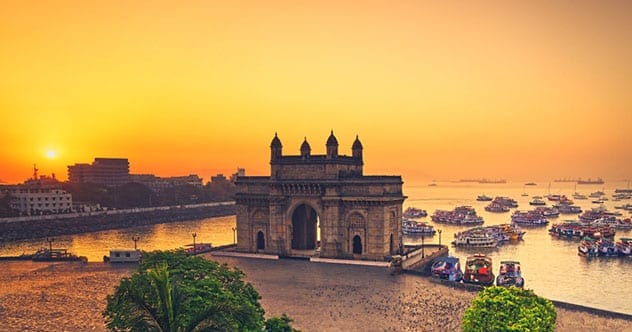
The Gateway of India, an iconic arch-monument in Mumbai, stands proudly overlooking the Arabian Sea. It was built to commemorate the landing of King-Emperor George V and Queen-Empress Mary in 1911, the first British monarchs to visit India. Ironically, it also became the spot from which the last British troops departed India in 1948 after independence. It’s a symbol of arrivals and departures, and of India’s colonial past and sovereign future.
In more recent times, the Gateway has taken on a new, poignant significance. Eleven years after the devastating 2008 Mumbai terror attacks, this landmark hosted the “26/11 Stories of Strength” event. The monument was illuminated, featuring the date of the attacks. The Indian Navy band performed, and prominent figures, including actor Amitabh Bachchan, shared messages of resilience and remembrance. The event honored the victims and survivors, transforming the Gateway into a powerful symbol of courage and unity in the face of adversity.
1Bridge of Sighs: Love and Last Goodbyes
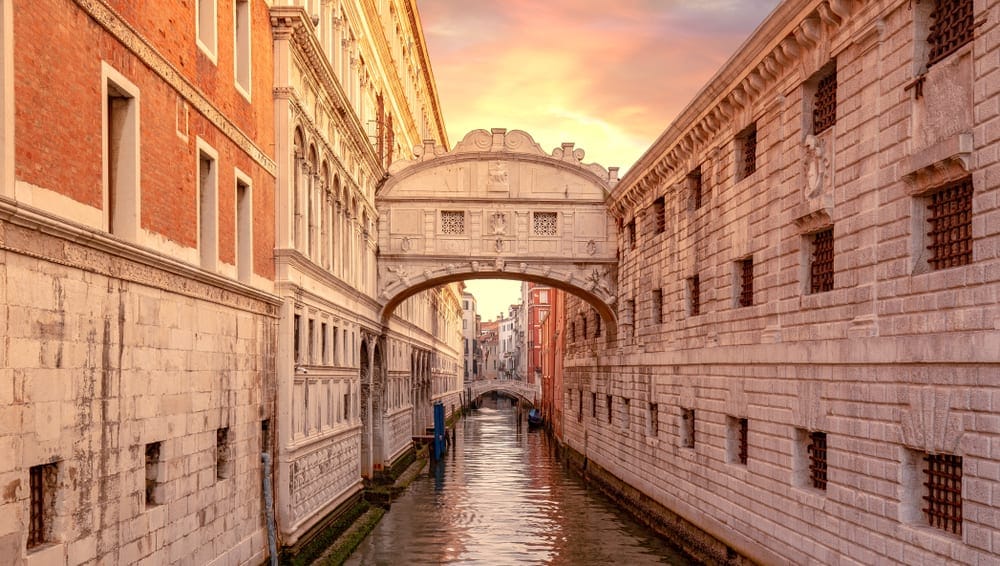
Venice, Italy, is famous for its canals and gondolas, and one of its most famous landmarks is the Ponte dei Sospiri, or the Bridge of Sighs. This enclosed limestone bridge, built in 1600, connects the Doge’s Palace’s interrogation rooms to the New Prison. It earned its evocative name from a rather somber tale. It was said that prisoners walking across this bridge to their cells would catch their last glimpse of beautiful Venice through its small windows and sigh, knowing their freedom was lost.
The poet Lord Byron helped popularize this notion, writing that it was the prisoners’ last view before potentially heading to their execution. However, a more romantic, and perhaps more modern, legend has also emerged. It claims that if a couple kisses in a gondola as they pass under the Bridge of Sighs at sunset, they will be granted eternal love and happiness. So, this single bridge carries echoes of both despair and enduring romance.
These tales remind us that landmarks are not just stone and mortar; they are woven into the cultural and emotional fabric of a place. They carry echoes of history, whispers of legends, and the enduring spirit of the people who built them or lived in their shadow. Each story adds a new dimension, inviting us to look closer and imagine the lives and events that shaped these iconic structures.
Which landmark story surprised you the most? Do you know any other fascinating tales about famous places? Leave your comment below and share your thoughts!


